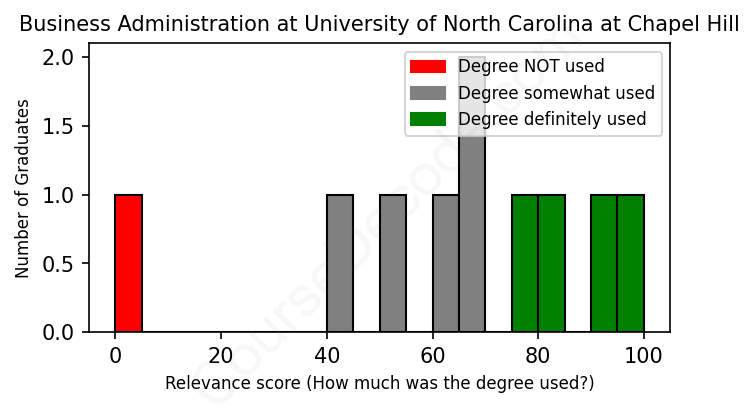
First, some facts. Of the Business Administration graduates from University of North Carolina at Chapel Hill we've analyzed , here's how many have used (or NOT used) their degree in their career:

These are estimates based on AI analysis of 10 LinkedIn profiles (see below).
The verdict? Slightly below average. Overall, with an average relevance score of 64%, Business Administration graduates from University of North Carolina at Chapel Hill have a slightly lower likelihood (-3%) of finding work in this field compared to the average graduate across all fields:
And for comparison, here's the chart for all profiles we've looked at across all degrees.
Also, after graduating, only 20% of these graduates have pursued further education other than another Bachelor's degree (such as a Masters degree or other), compared to the average across all profiles of 35%. This suggests a Bachelors degree is enough for most Business Administration graduates, and it's normal to look for work straight after graduation.
See the details:
|
Relevance score: 97% We think this person has gone into a career highly relevant to their degree. We think this person has gone into a career highly relevant to their degree.
DEGREE INFOGraduated in 2014 from University of North Carolina at Chapel Hill with a Bachelor of Science - BS in Business Administration. Also pursued further education since (see below). JOB HISTORY SINCE GRADUATIONBusiness Analyst McKinsey & Company Jun 2014 - May 2016 Engagement Manager  McKinsey & Company Jul 2018 - Aug 2021 Chief Executive Officer  Gnome Aug 2021 - Feb 2024 Advisor  Wiser AI Mar 2024 - Present FURTHER DEGREES DONE SINCE GRADUATINGMaster of Business Administration - MBAThe Wharton School 2016 - 2018 ABOUTNo information provided. |
The top 10 most common jobs done by the graduates we've analyzed (ranked most common to least) are:
When looking at jobs held by graduates from the Business Administration program at the University of North Carolina at Chapel Hill, it’s clear that many have ventured into finance-related positions. Roles like Finance Manager, Financial Director, and various analyst positions dominate the list, showing a strong alignment with skills learned during their studies. These jobs require a solid understanding of financial principles, strategic management, and operational oversight, which are all core components of a Business Administration degree. Notably, positions at firms like McKinsey & Company and various banks highlight a trend where graduates are stepping into analytical, managerial, or executive roles that heavily rely on their academic training.
However, not every job has maintained that relevance. Some roles, especially those centered around secretarial or support tasks, only tangentially relate to Business Administration skills. For instance, positions like Secretary at Jupitar Aluminium or QBE Insurance do not utilize the comprehensive knowledge expected from a Business Administration graduate. Moreover, roles in specialized fields, like a Product Analyst or certain IT functions, while they may use some business concepts, don’t fully leverage the breadth of skills taught in the degree. In general, while a significant amount of jobs found by these graduates are quite relevant to their education, there are exceptions where the connection to Business Administration principles may be weaker or even absent. Overall, it appears that pursuing a career in finance, consulting, or management is where most of these graduates find themselves thriving post-university.
Here is a visual representation of the most common words in job titles for Business Administration graduates (this is across all Business Administration graduates we've analyzed, not just those who went to University of North Carolina at Chapel Hill):

Graduates from the University of North Carolina at Chapel Hill who studied Business Administration seem to have quite promising career trajectories. Many of them land solid jobs right after graduation, often in roles related to finance, consulting, or management. For example, graduates from 2011 and 2014 moved up quickly in finance and consulting roles, with one even becoming a CEO just a few years after starting as a business analyst. It suggests that early entry-level positions, such as analysts or consultants, are pretty common, which can serve as stepping stones to more senior roles in just a few years.
As time progresses—five to ten years after graduating—many of these alumni find themselves in higher-level managerial positions. For instance, graduates from 2016 have become Vice Presidents and Senior Vice Presidents in their respective fields, indicating a clear upward trajectory. Others have transitioned from analyst roles to more strategic leadership positions. While there are a few paths that seem less directly aligned with Business Administration, like secretarial roles, the overall trend points towards successful careers that leverage the skills acquired during their studies. So, if you're considering a degree in Business Administration at UNC, it looks like a smart move if you want to enter the business world and build a remarkable career!
Getting a Bachelor’s degree in Business Administration at UNC Chapel Hill isn’t a walk in the park, but it’s not the hardest thing in the world either. The program has a good mix of challenging coursework and practical applications, so if you're willing to put in the effort, you’ll find a lot of support along the way. There will be some tough classes, especially in areas like finance and statistics, but it’s pretty manageable for most students if you stay organized and engaged. Plus, being at a school with a strong business program means you also have access to resources like tutoring and study groups which makes things easier. So, if you've got the motivation and can handle a bit of stress, you should be able to navigate it just fine!
Most commonly, in the LinkedIn profiles we've looked at, it takes people 4 years to finish a Bachelor degree in Business Administration.
Alright, so looking at these UNC Chapel Hill grads, it definitely seems like some of them have made some solid cash in their careers post-graduation! The folks from finance and consulting seem to have climbed the ladder pretty quickly, especially the one who went from analyst to vice president—definitely raking in a good salary. On the other hand, some graduates appear to be in more entry-level positions like the paralegal and various secretarial roles, which usually don't pay as well, especially early on. Overall, it's a mixed bag: some have found themselves in lucrative spots, while others are still grinding to get there. But hey, that’s how it goes—hard work can pay off big time in the long run!
Here is a visual representation of the most common words seen in the "about" section of LinkedIn profiles who have a Bachelor degree in Business Administration (this is across all Business Administration graduates we've analyzed, not just those who went to University of North Carolina at Chapel Hill). This may or may not be useful:

Here are all colleges offering a Bachelor degree in Business Administration (ordered by the average relevance score of their Business Administration graduates, best to worst) where we have analyzed at least 10 of their graduates: